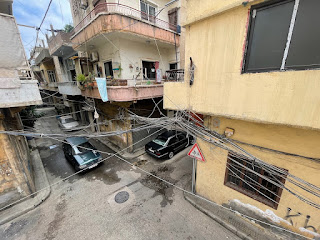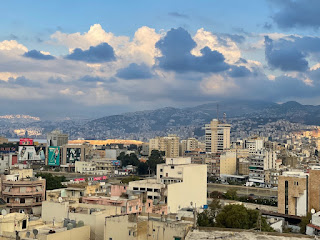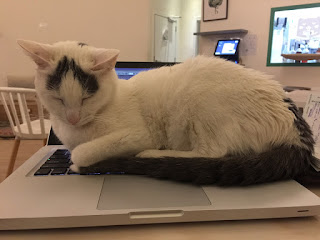Motion Sickness
46.Motion Sickness (31 December 2021)
 |
Awaiting one of our flights out of Philadelphia
(15 Oct. 2021 - Phila. Intl. Airport)
|
One of the
constants of air travel, as well as ground travel, is the ubiquitous plastic-lined
bag for the use of those experiencing stomach discomfort while being jostled
back and forth, up and down, and side to side in the plane, boat, train, bus or
car they are in. It also helps those around them to be able to stay clean and
somewhat spared from the odor, though the poor sufferer continues to suffer
what is gently referred to as “motion sickness”.
We have been experiencing a type of “motion
sickness” in recent times as we completed our required home assignment and made
our way back to Lebanon last week. It was an uneventful flight, except that the
airplanes were crowded cheek-to-jowl with travelers, some with masks, including
those going to Lebanon. Maria and I lived through five months in the U.S. and
Canada of constant travel, constant packing and unpacking, constant
calculations of whether the weather would be warm or cold, along with constantly
arranging flight and hotel bookings, constantly working on what kind of
presentation fits a particular audience, constantly trying to wrap up paperwork
and follow up on unfinished tasks in the concluding weeks when we were supposed
to be “resting”. Getting back home to Beirut and its daily stresses and misery afforded
us a bit of respite from the previous period!
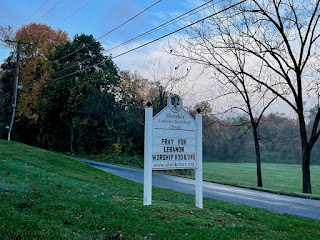 |
Many ordinary people want to learn, pray and
help Lebanon. (31 Oct. 2021 - Pottstown, Pa.)
|
Yet it wasn’t all misery, because we
got to meet wonderful, caring people, Armenian and non-Armenian, many of whom
were aware of the trials being endured by the Lebanese and the Lebanese-Armenian
community. Hearing their questions, seeing their concern and willingness to do
something, hearing their words of blessing and being with them in God’s
presence was a gift we gratefully received. Yet it was balanced by the exhaustion
of upwards of 14,000 mi / 22,000 km of traveling (aside from the 16,000 mi /
25,000 km to actually get to the US and back)! Enviable? Perhaps. I suppose it
depends on who is doing the envying.
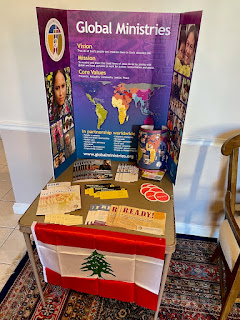 |
Getting the word out about Lebanon
(6 Nov 2021 - Belmont, Mass.)
|
There is a TV ad that has appeared
recently on Lebanese television depicting two young Lebanese boys talking about
their dreams, which include going to school. It concludes with a voice-over stating,
“Rights should not be just dreams.” Yet the dreams of a preponderance of people
around us is not to have Lebanon become a livable country, but to leave
Lebanon for a livable country. This “exit strategy” is based on yet a
different kind of motion sickness: that of being made sick by a society that
never experiences stability, that is continually in motion due to the profit-seeking,
power struggles or whims of those in authority, whether locally, regionally or worldwide.
On Beirut’s streets over the years,
in my limited Arabic, I would often hear passersby including numbers in their
conversations, assumedly regarding the price of this or that. How I wished that
the conversations would revolve around ideas, or culture, or wonder at God’s
creation! Today virtually all of the street conversations, and possibly
also the private ones, are about the exchange rate, the cost of cheese and medicine, and the
impossibility of carrying on in these conditions. One man at the exchange house
said, “We’re living in an insane asylum!” I wish that my Arabic had not
improved to the point where I could understand this much.
 |
Exciting times on Home Assignment
(6 Dec. 2021 - Broomall, Pa.)
|
Economic freefall produces one kind
of motion sickness. Seeing dear friends and family members continually zoom
away from you (and I’m not referring to screen time) can produce a similar spiritual
nausea. When a family, or a community such as the Armenians, conclude that
social disintegration is the best route to take, that their children must leave
the country, then there is not much that can be said about the hopes for that
family’s (or that people’s) future. Even if you are driven by the patriotic
emotions that so often cloud Armenians’ judgment about their viability as a people,
the consequences of cultural and societal disintegration cannot be dismissed.
Many a person will insist on the necessity of laying hold, without delay, of
the “promise of a better (economic, educational, health and secure) future
elsewhere” – something that is only a promise, not a guarantee. It will apply
to some lucky individuals, but what will become of collective identity? What will
become of community? What will bring health and strength to the family, that
place where individual and collective identity is formed and nurtured? We are
in a rush toward “every man for himself”; and the shards of what was a
collective hope, a concerted effort to come together to endure hardships and grow
in character (such as was seen in the post-Genocide era), will become merely
the subject of books and articles that very few read or care to reflect upon.
Only a collective awakening to our spiritual and cultural resources can offer
us a more hopeful outcome.
 |
It's Christmastime in the city...
(30 Dec. 2021 - Geitawi–Beirut)
|
I realize that I enjoy privileges
and resources that few around me have. Yet I also have a perspective that many
around me lack: that of having experienced the long-term consequences of living
in a diaspora situation, in societies that are quite capable of swallowing up and
homogenizing the qualities and distinctives that define a people group,
including their language, creativity, spirituality, world view, and desire to
survive and thrive as a unique entity. The motion sickness that we are all enduring
will make it difficult, but all the more crucial, that we together take the
long-term into account as well as the short- and medium-term… and listen well
to each other.
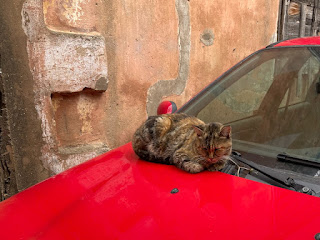 |
LebCat 46: You look smashing in red... I mean
on red. (28 Dec. 2021 - Mar Mikhael–Beirut)
|
One of the pleasures I enjoyed during
“home assignment” was getting back to exercising (which is important, considering
how much I enjoyed the pleasures of overeating and gaining weight during that
same period). It was a long time since I was able to go to the gym at 6:30 a.m.
and get a bit of sweat going. I also got back on the mat at the aikido dojo, but
quickly remembered that aspect of warmups that I dread: forward and backward
rolls. I dread them because of the dizziness they cause me. But I have learned
that the way to work through this sensation is, first of all, to properly position
my body to roll; second, to do the rolls more frequently; and third to fix my
eye and my mind on a distant, stable point. That long-distance view enables me to
be steady when the world seems to be slanted this way or that.
My prayer for Lebanon, and in particular
for the Armenian people, is that we fix our eye on that unchanging Point who
does not change (James 1.17), who brings calmness, steadfastness and faith in
Christ in the midst of the storm, and who blesses his people in the most
difficult of circumstances with the enduring riches of wisdom, truth and love. [LNB]

